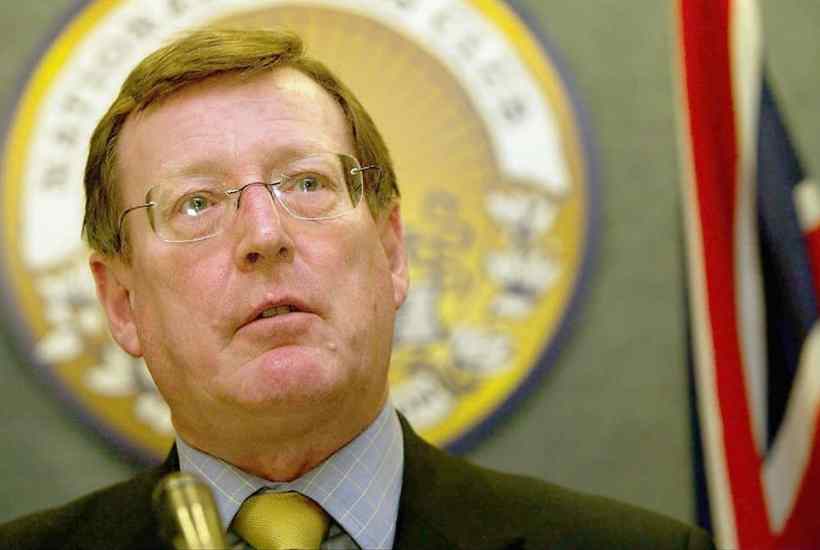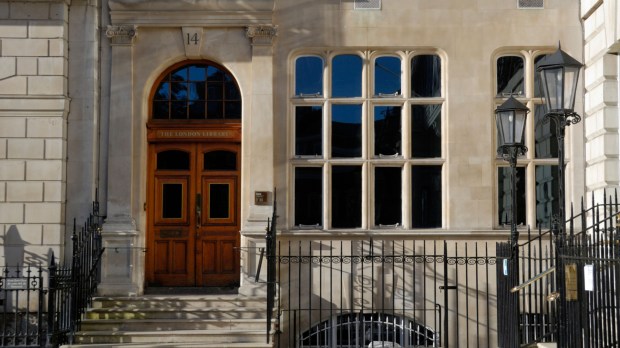David Trimble, who has just died, has rightly been praised for his courage. History may prove him to have been Unionism’s last statesman. But the well-known people who sincerely eulogised him this week – Tony Blair, Bill Clinton, Jonathan Powell – all helped end his career. There are many good things to be said for the Belfast Agreement, and no one said them better than David, but it achieved at least one big, bad thing: it undermined moderation in Ulster politics. By persuading Trimble to move so far, Blair and co separated him from his political roots. This broke Trimble’s Unionists and empowered the much more sectarian followers of Ian Paisley. A comparable process on the other side weakened the non-violent SDLP and fulfilled Sinn Fein/IRA’s once-impossible dream of becoming the main nationalist party in Northern Ireland. Some say this tamed the extremes. I wonder. What Paisleyites and Sinn Fein excel at is fighting for their tribe’s share of the spoils. They are rival gangs, jealously protecting their own manors. This is not stable, and it is not true peace.
Before the BBC Tory leadership debate on Monday night got rather heated, Rishi Sunak began with good words about Lord Trimble, which Liz Truss echoed. Following his example, I started my interview with Mr Sunak in this paper with a related question. Trimble’s last interventions in public life concerned the Northern Ireland Protocol. In his view, it violated two aspects of the Agreement of which he was especially proud. One was the East/West dimension (i.e. the relationship between Northern Ireland and mainland Britain). He was a true British Unionist, after all, not just an Ulster one. The other was the principle of consent for all changes in the constitutional status of Northern Ireland. No such consent for the Protocol was ever sought. Mr Sunak answered my question with great respect for David Trimble, but in a way that made me think he does not agree with him. If he becomes prime minister, expect the Protocol to stay, though perhaps smoothed down over time. If Liz Truss gets the job, expect a fight. I think David Trimble was a Trussite.
Of all the too many politicians I have interviewed over 40 years, I would say that Rishi Sunak is the hardest since Mrs Thatcher to catch out on matters of fact. Indeed, he may be even more reliable on detail than she was, because his memory is less coloured by political purpose. He is very much the bright boy who got 99 per cent in exams – not boastful, just loving accuracy (hence the Rishi/Boris personality clash). I did not so much like his new Monday-night persona of the angry interrupter, preferring the usually scrupulous politeness which he displays in my interview; but I was moved by his reckless courage on one point. Liz Truss was attacking ‘bean counters’, a group who are always, by the very phrase, seen as contemptible. Yet Mr Sunak jumped in to defend them, asserting the absolute importance of their work. It struck me that there must be hundreds of thousands of bean counters ‘out there’ who have never before been praised in political debate. Who next for Rishi’s warm embrace? ‘Faceless bureaucrats’? ‘Jobsworths’? ‘Sir Humphreys’? This really is compassionate Conservatism.
It is impressive that, despite the enormous weight of money and power behind the idea, the plan for a Holocaust memorial and learning centre in Victoria Tower Gardens has been stopped by law. By interesting coincidence, Richard Buxton, the solicitor for the opponents, is the great-great-great-grandson of Thomas Buxton, whose successful bill to abolish slavery in 1833 is commemorated in the fountain in the gardens which would be adversely affected by the Holocaust memorial. Last week, a judge rejected leave to appeal against the ruling of Mrs Justice Thornton (Mrs Ed Miliband in civilian life) that the 1900 Act which established the gardens forbids the large building project required. The fact that the case was ‘high profile’, said the judge, did not mean there was any reason in law why it should be re-heard. What a pity, then, that the government has restated its commitment to building in Victoria Tower Gardens and there is talk of amending the coming Levelling-up Bill to get rid of the 1900 Act. The earlier decision to push on with the memorial was taken by Chris Pincher, who subsequently became known to a wider public for other reasons. The scheme’s costs are huge. Its content is not thought through. It is strongly resisted both by local residents and by many in the Jewish community who regard it as a vanity project. Surely whoever becomes prime minister should think again, and save more than £100 million in the process.
It was the day before the latest rail strike and the tannoy in the station warned us passengers to behave ourselves. ‘No one,’ it declared loudly across the concourse, ‘should have to tolerate threatening or abusive behaviour whilst doing their job.’ Of course, of course, quite right, I thought; but then an angry worm entered my brain. What about when they are not doing their job, I found myself asking.
The current heat and water shortage take me back to the drought of 1976, which I enjoyed because I was young. We undergraduate friends went on a barge holiday which moved rather slowly because it was hard to fill the locks. At night, we slept on the roof of the barge, which enabled me to get to know my future wife better. In many places, people had to collect water from standpipes. I remember having tea after a hard day’s work in the garden and turning on the PM programme. A villager was interviewed in a stand-pump queue. ‘I don’t think Hitler got up to anything much worse than this,’ he complained. For me, this was an early lesson in the mad disproportion that sometimes lurks in localism – the same impulse that leads people to kill one another over a leylandii hedge.
Got something to add? Join the discussion and comment below.
Get 10 issues for just $10
Subscribe to The Spectator Australia today for the next 10 magazine issues, plus full online access, for just $10.
You might disagree with half of it, but you’ll enjoy reading all of it. Try your first month for free, then just $2 a week for the remainder of your first year.















Comments
Don't miss out
Join the conversation with other Spectator Australia readers. Subscribe to leave a comment.
SUBSCRIBEAlready a subscriber? Log in